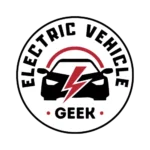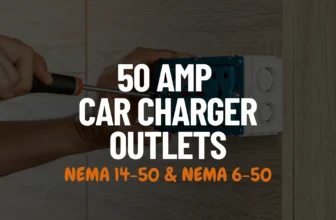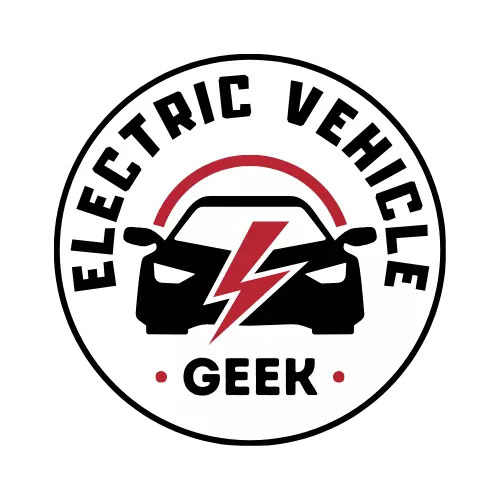When buying E.V. Chargers and accessories, you will often see E.V. Charger Standards used in stores such as Amazon; you will also see the standards when buying or selling an electric vehicle and vehicle charging station specifications.
I was introduced to the world of E.V. Charger Standards when I was learning about E.V. Charger installations, and we needed to know about E.V. charger standards for our exams. Owning an electric vehicle and working in the electric vehicle industry, we often see the E.V. Charger Standards, and today, you will learn from the experts about these standards.
In this blog post, you will learn about E.V. charging standards for connectors such as SAE J1772, CHAdeMO, CCS, Tesla Supercharger, and ISO 15118 / Plug and Charge.
You will learn about standard specifications, protocols, or electric vehicle (E.V.) charging guidelines. Also, standard SAE J1772 E.V. charging levels include Level 1 – 120V chargers, Charge Level 2 – 240V, and Level 3 – D.C. Fast chargers.
What is the Electric Car Charging Standard?
The Electric Car Charging Standard is the standardization and interoperability in the electric vehicle industry formed to ensure interoperability and connectivity between electricity supply points and E.V. chargers worldwide.
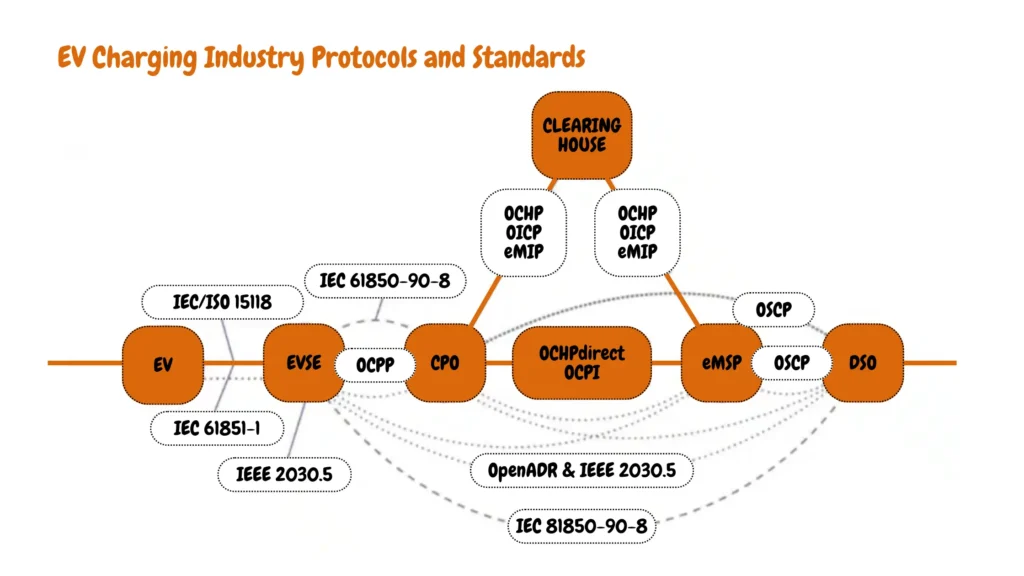
There are three main international organizations responsible for the standardization of EV charging infrastructures, including the International Electrotechnical Commission (IEC), the International Organization for Standardization (ISO), and the International Telecommunication Union (ITU).
Electric Vehicle Charging Standards
In the domain of the electric vehicle charging infrastructure, the following are the basic E.V. charging standards for connectors:
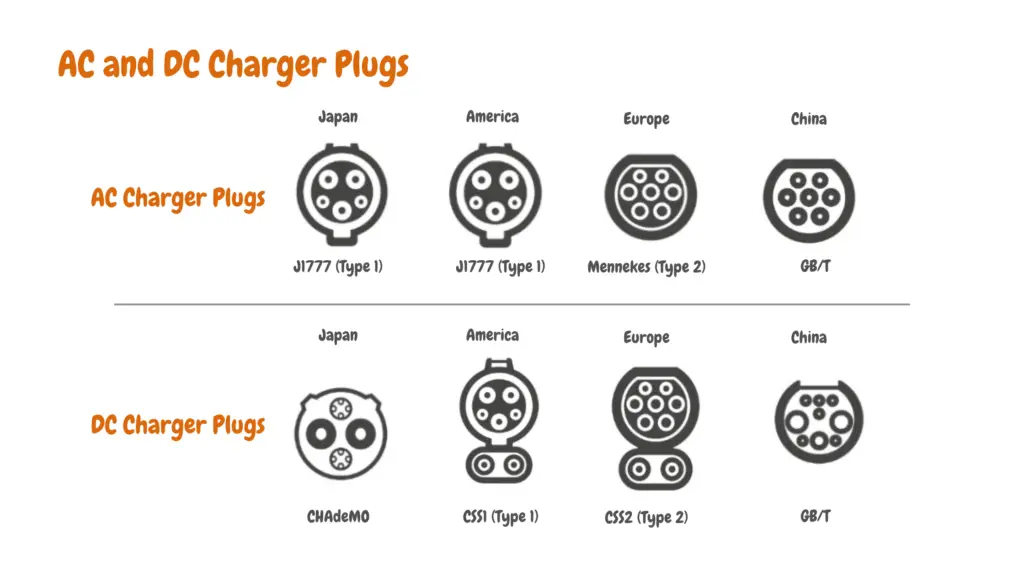
SAE J1772
- Industry standard for Level 1 and Level 2 charging.
- Widely used in North America for connecting to E.V.s.
SAE J1772 Electric Vehicle Charging Levels
The SAE J1772 standard defines three levels of charging:
Level 1 – 120V chargers
- Universal charging option using a standard 120V socket.
- Common in homes and garages, providing a slow charging rate of 3 to 5 miles of range per hour.
Charge Level 2 – 240V
- Faster charging with 220-240V plugs, commonly found in public charging stations and homes.
- It is ideal for home installation, offering around 40 amps and significantly reducing charging time.
Level 3 – D.C. Rapid/Fast/Superchargers
- Fast chargers that use direct current (D.C.) methods for rapid charging.
- Mighty 50-350 kW chargers can replenish an E.V. in twenty to thirty minutes.
- It is ideal for quick roadside stops or retail locations.
CHAdeMO
- First introduced connector, prominent in Japan and on E.V.s from Japanese manufacturers like Toyota, Mitsubishi, Subaru, and Nissan.
CCS (Combined Charging System)
- Allows AC/DC charging on the same port, preferred by European and American automakers, including BMW, Ford, Jaguar, GM, Polestar, Volkswagen, and Tesla.
Tesla Supercharger
- The proprietary connector is used exclusively on Tesla models in North America.
- Tesla offers adapters for CHAdeMO and CCS in specific markets.
ISO 15118 / Plug and Charge
- A V2G communication interface allowing bi-directional charging/discharging of E.V.s.
- Plug and Charge protocol seamlessly bills the driver without additional cards or apps.
- They are supported by various E.V.s like the Mustang Mach-E, Lucid Air, and Porsche Taycan as a standard feature.
Electric Vehicle Supply Equipment Standards
Electric Vehicle Supply Equipment (EVSE) Standards allow standardization of E.V. charging stations or E.V. Charging docks, which provide electric power to the electric vehicle batteries; they allow standardization of EVSE systems such as electrical conductors, related equipment, software, and communications protocols that deliver electric power to the electric vehicle.
Electric Vehicle Supply Equipment Standards Include:
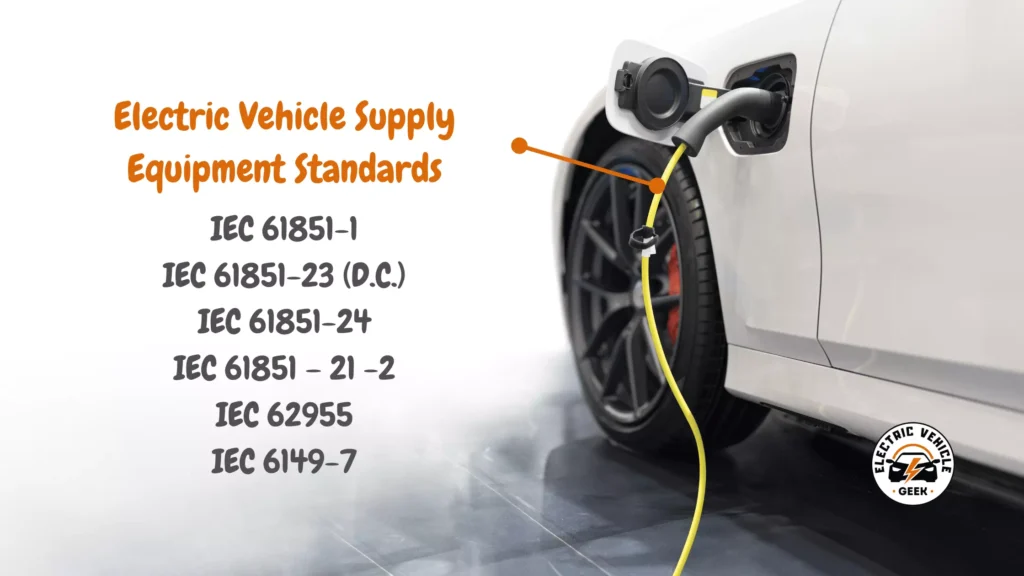
IEC 61851-1
IEC 61851-1 is an A.C. Charging standard that specifies the general conductive charging systems for electric vehicles (EVS).
IEC 61851-23 (D.C.)
IEC 61851-23 (D.C.) is a D.C. Charging standard for electric vehicles using D.C. charging systems, it provides the requirements of D.C. charging systems of electric vehicles.
IEC 61851-24
IEC 61851-24 is a communication standard that addresses the communication between electric vehicles and the charging infrastructure to facilitate control and monitoring.
IEC 61851 – 21 -2
IEC 61851 – 21 -2 is a conductive charging system communication stand protocol between the electric vehicle and the conductive charging system.
IEC 62955
IEC 62955 is a battery electric vehicle wireless charging standard that specifies the general requirements and testing methods for wireless charging systems used in charging electric vehicle batteries.
IEC 6149-7
IEC 6149-7 is an electric vehicle power transfer system standard that specifies the general requirements and testing methods used in electric vehicle power transfer systems.
E.V. Charging Cables Standards
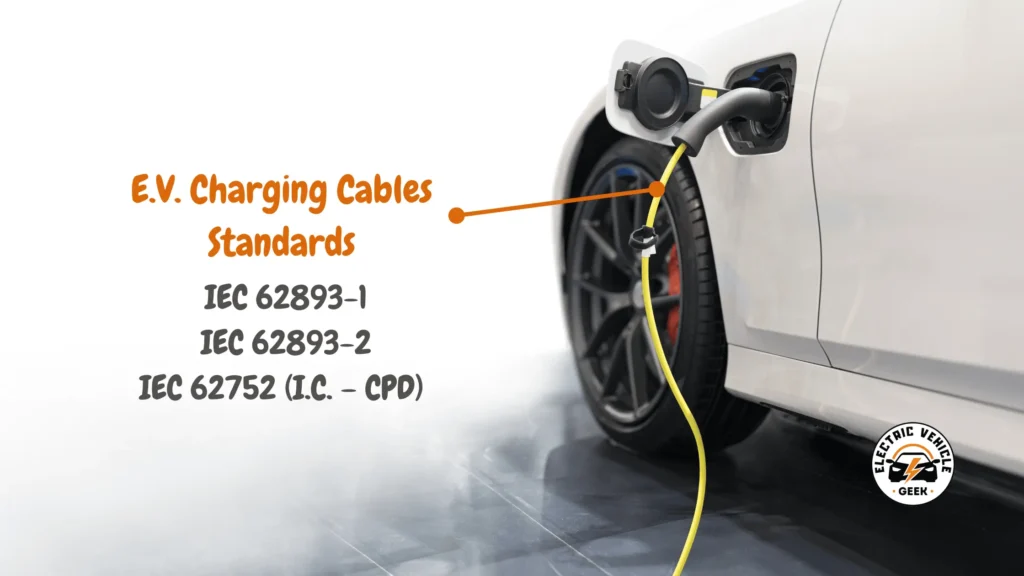
IEC 62893-1
IEC 62893-1 is a general charging cable standard that specifies the general requirements of electric vehicle charging cables, including the electric vehicle charging cables covering designs, construction, and safety considerations.
IEC 62893-2
IEC 62893-2 is a charging cable standard that details charging cable requirements focusing on specific types, characteristics, and use cases within the electric vehicle charging infrastructure.
IEC 62752 (I.C. – CPD)
IEC 62752 (I.C. – CPD) is a charging cable product standard that specifies product-related requirements of electric vehicle cables. The IEC 62752 (I.C. – CPD) focuses on safety, performance and compliance with applicable standards; further, the “I.C. – CPD” designation indicates conformity to the Construction Products Directive.
Electric Vehicle Connectors & Inlets Standards.
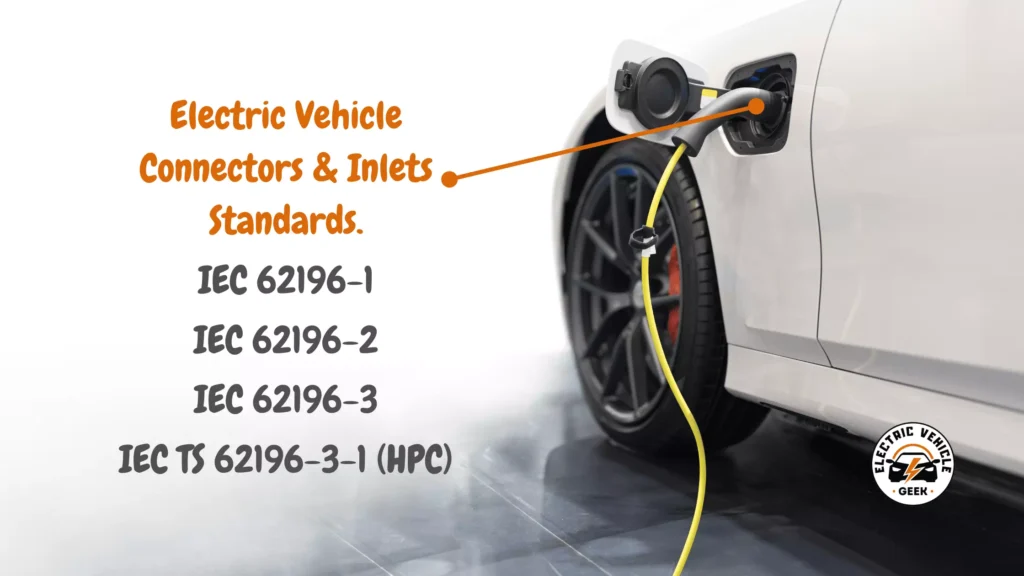
IEC 62196-1
IEC 62196-1 is an Electric Vehicle Connector and inlets general standard that specifies the dimensional and functional requirements of electric vehicle connectors and focuses on the communication between the electric vehicle and the charging infrastructure.
IEC 62196-2
IEC 62196-2 is an A.C. charging inlet standard that specifies the characteristics and requirements of electric vehicle A.C. charging inlets; the IEC 62196-2 specifies the aspects of the electric vehicle side A.C. charging inlets.
IEC 62196-3
IEC 62196-3 is a D.C. charging inlet standard that focuses on the characteristics of D.C. electric vehicle inlets intended for D.C. charging. The IEC 62196-3 details electric vehicles in D.C. charging inlets.
IEC TS 62196-3-1 (HPC)
IEC TS 62196-3-1 (HPC) is a High Power Charging (HPC) Inlet Standard technical specification that specifies the requirements for high-power electric vehicle D.C. charging inlets; the High Power Charging (HPC) Inlet Standard addresses the electric vehicle aspects for high-power charging.
Communication EV-EVSE Standards
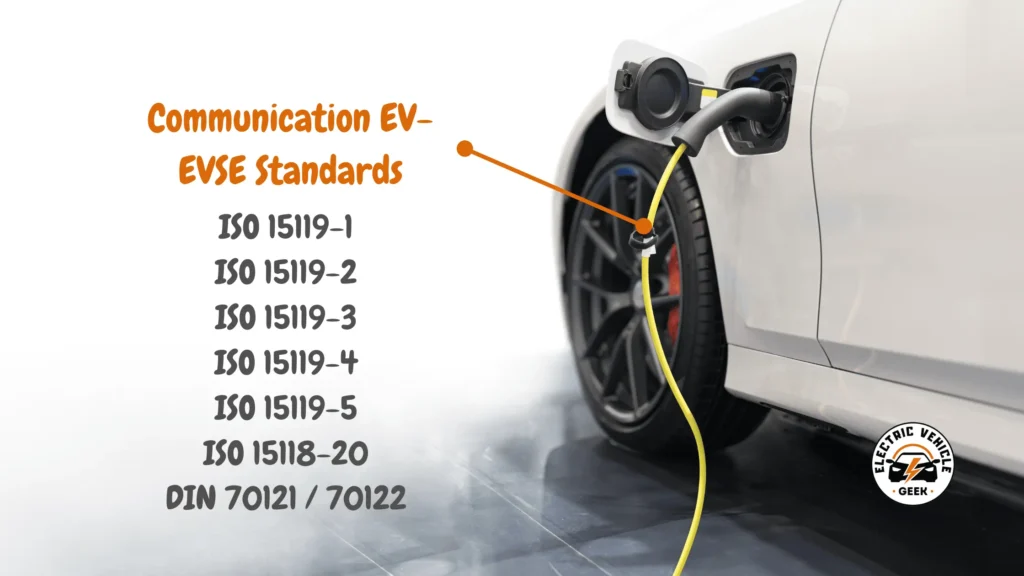
ISO 15119-1
ISO 15119-1 is a general communication standard between electric vehicles (E.V.s) and electric vehicle supply equipment (EVSE).
ISO 15119-2
ISO 15119-2 is a physical layer communication standard for E.V. charging infrastructure that focuses on the physical layer requirements for communication between E.V.s and EVSE and addresses aspects relating to the connectors and cables used in electric vehicle supply infrastructure.
ISO 15119-3
ISO 15119-3 is a data link layer communication standard that details the requirements for communication between E.V.s and EVSE; the ISO 15119-3 standards specify the protocols and data exchange methods in E.V. charging infrastructure.
ISO 15119-4
ISO 15119-4 is a network layer communication standard that specifies the application layer requirements for communication on an E.V. charging infrastructure process, emphasizing the aspects related to network architecture and communication protocols.
ISO 15119-5
ISO 15119-5 is an application layer communication standard that specifies the application layer requirements for communication in an E.V. charging environment; the ISO 15119-5 standard details the protocols and data formats used at the application level of an E.V. charging infrastructure.
ISO 15118-20
ISO 15118-20 is a communication standard extension of ISO 15118-2, which supports wireless power transfer (WPT); ISO 15118-20 defines the communication standards between electric vehicles and the E.V. charging infrastructure, including A.C. and D.C. charging, Plug and Charge, Smart Charging, and possibilities and use cases by specifying bidirectional, wireless, and pantograph charging.
DIN 70121 / 70122
DIN 70121 and DIN 70122 are German charging communication standards that collectively address the communication standards for E.V.s and EVSE in Germany; the German Charging Communication Standards cover various communication layers and protocols.
Connectors, Inlets & Plugs Standardization
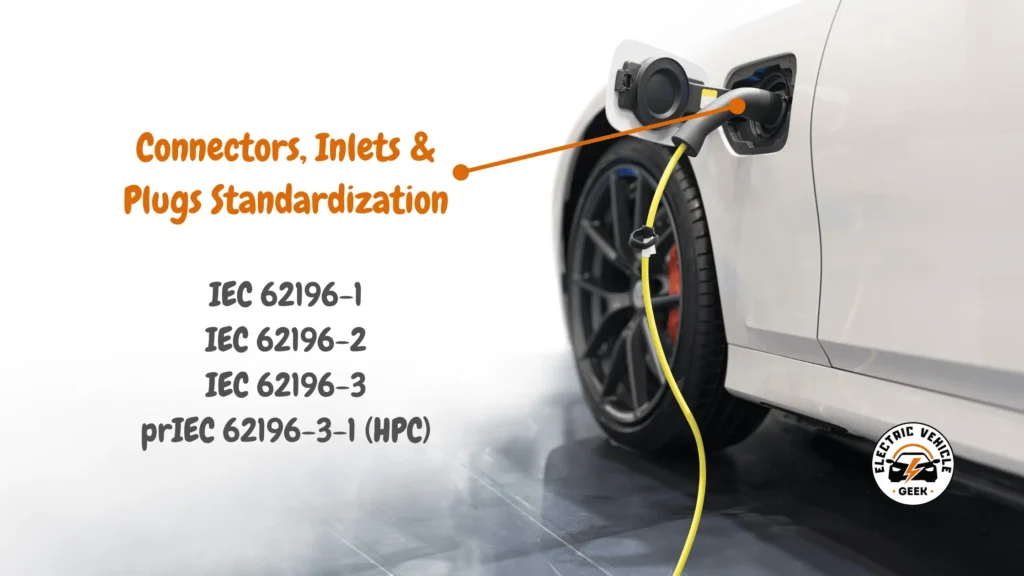
IEC 62196-1
IEC 62196-1 is a general connector standard that specifies the requirements of electric vehicle connectors; it focuses on the communication and physical aspects of the electric vehicle and the E.V. charging infrastructure.
IEC 62196-2
IEC 62196-2 is an A.C. charging inlet standard that defines the characteristics and requirements for electric vehicle inlets intended for A.C. charging, concentrating on the aspects of the vehicle side.
IEC 62196-3
IEC 62196-3 is a D.C. charging inlet standard that defines the characteristics and requirements for electric vehicle inlets intended for A.C. charging; it details the aspects related to the electric vehicle inlet.
prIEC 62196-3-1 (HPC)
prIEC 62196-3-1 (HPC) is a high-power charging (HPC) inlet standard that addresses the requirements for high-power D.C. charging inlets in electric vehicles, and it explicitly focuses on the vehicle side aspects of high-power charging to ensure interoperability and connectivity between the electric vehicle and the high power charger of the electric vehicle.
Communication Standardization
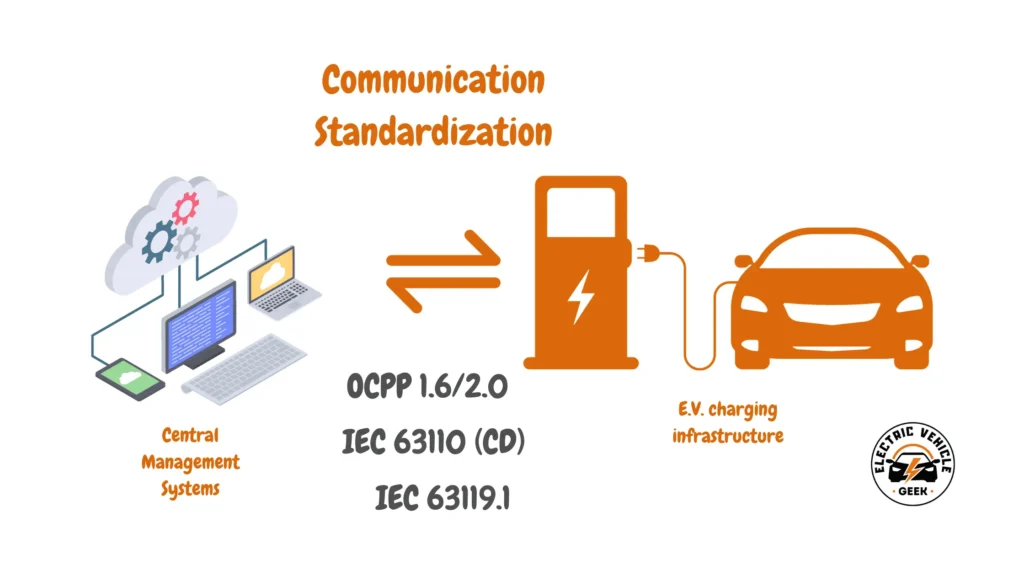
OCPP 1.6/2.0
OCPP 1.6/2.0 is a communication standardization related to the Open Charge Point Protocol (OCPP); the OCPP is an open-source communication protocol that is widely used in the central management systems in the electric vehicle industry; the OCPP facilitates the communication between E.V. charging infrastructures and the management systems.
IEC 63110 (CD)
IEC 63110 (Committee Draft (CD)) is a communication standardization that defines a protocol for managing electric vehicle charging and discharging infrastructures; the document is in the early stages of development and is subject to potential revisions.
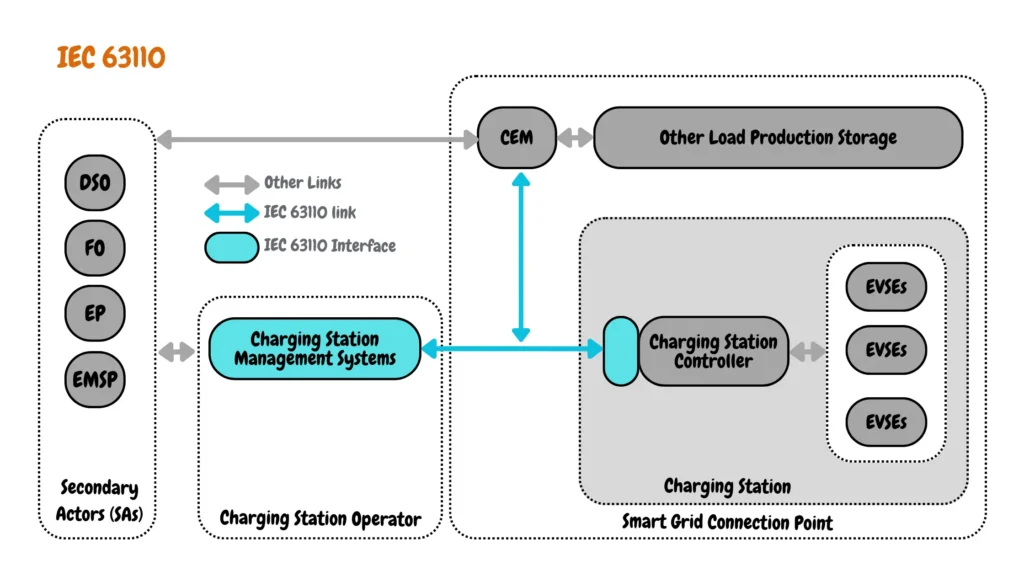
IEC 63119.1
IEC 63119.1 is a communication standardization of E.V. charging infrastructure that specifies the communication requirements for wireless power transfer (WPT) systems for electric vehicles; the IEC 63119.1 communication standard details the aspects related to the communication between the electric vehicles and the E.V. charging infrastructure in E.V. wireless charging scenarios.
On-Board Chargers Standards
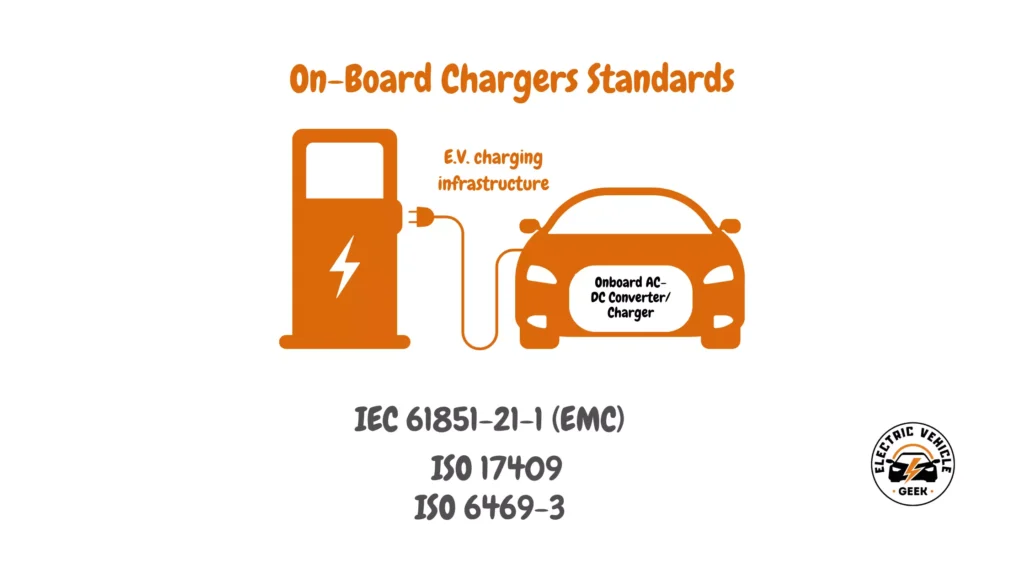
IEC 61851-21-1 (EMC)
IEC 61851-21-1 (EMC) is an onboard charger Electromagnetic Compatibility (EMC) Standard that specifies the EMC requirements for onboard chargers in electric vehicles, ensuring compatibility with electromagnetic interference standards when charging an electric vehicle.
ISO 17409
ISO 17409 is an on-board charger testing standard for electric vehicles; it highlights the test methods and requirements for evaluating the performance and safety of on-board chargers for electric vehicles.
ISO 6469-3
ISO 6469-3 is the on-board chargers standard that outlines the safety standards of on-board chargers of electric vehicles; the part of the ISO 6469 series primarily focuses on the safety requirements for electric vehicles, including aspects related to on-board chargers.
Wireless Power Transfer Standards (WPT)
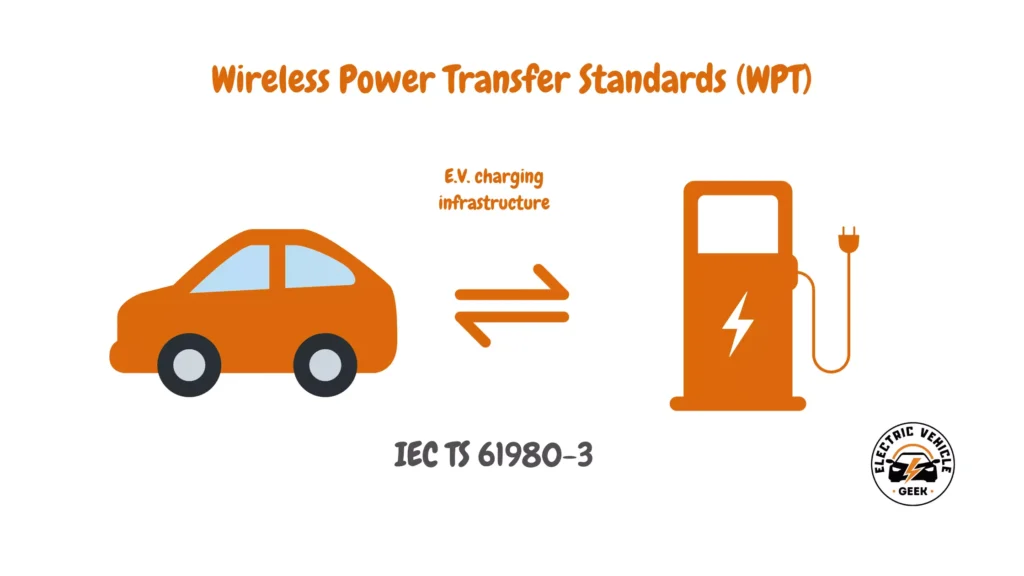
IEC TS 61980-3
IEC TS 61980-3 is the technical specification for wireless power transfer standards that outline the requirements and guidelines for wireless power transfer systems of E.V. charging infrastructures, ensuring interoperability and safety in wireless charging infrastructures of electric vehicles.
Grid Connection Standards
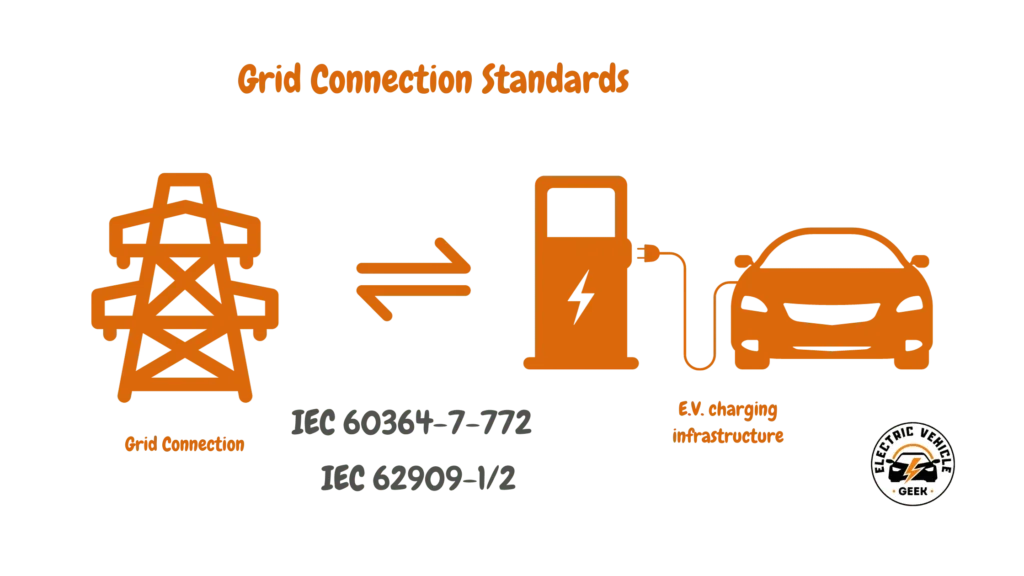
IEC 60364-7-772
IEC 60364-7-772 is an electrical installation of building standard that focuses on electrical installations in buildings; the IEC 60364-7-772 grid connection standard addresses the requirements for selecting and installing electrical equipment for electric vehicle charging infrastructure, including grid connection aspects.
IEC 62909-1/2
IEC 62909-1/2 is a grid integration of electric vehicles standard that addresses the grid integration of electric vehicle charging infrastructure; IEC 62909-1/2 specifies the requirements and guidelines for connecting electrical vehicles charging infrastructure to the grid to ensure compatibility and safety in the grid connection process.

James Ndungu is a certified EV charger installer with over five years of experience in EVSE selection, permitting, and installation. He holds advanced credentials, including certification from the Electric Vehicle Infrastructure Training Program (EVITP) and specialized training in EV charging equipment and installation, as well as diplomas in EV Technology and Engineering Fundamentals of EVs. Since 2021, James has tested dozens of EV chargers and accessories, sharing expert insights into the latest EV charging technologies.
